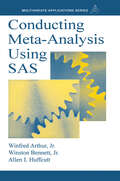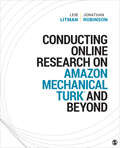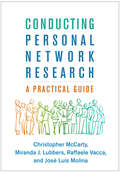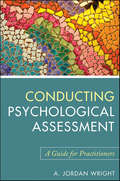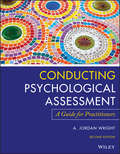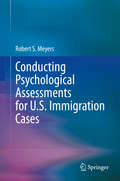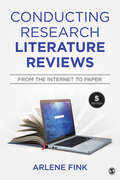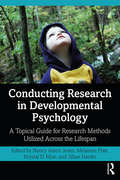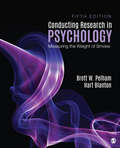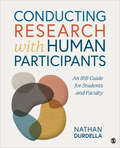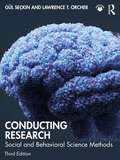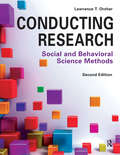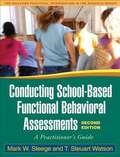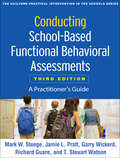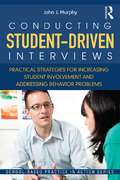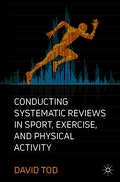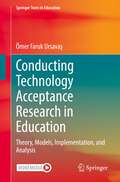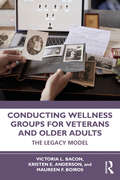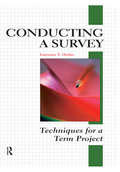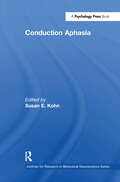- Table View
- List View
Conducting Interviews with Child Victims of Abuse and Witnesses of Crime: A Practical Guide
by Mireille CyrThis book is a practical and thoughtful guide for the forensic interview of children, presenting a synthesis of the empirical and theoretical knowledge necessary to understand the account of child victims of abuse or witnesses of crime. It is a complex task to interview children who are suspected of being abused in order to gather their stories, requiring the mastery of many skills and knowledge. This book is a practical one in that constant links are made between the results of the research and their relevance for the interventions made when interviewing child victims of abuse or witnesses of crime and in understanding their accounts. This book also presents in a detailed and concrete way the revised version of the National Institute of Child Health and Human Development (NICHD-R) Protocol, a forensic structured interview guide empirically supported by numerous studies carried out in different countries. The step-by-step explanations are illustrated with a verbatim interview with a child, as well as other tools to help the interviewer to prepare and handle an efficient and supportive interview. Conducting Interviews with Child Victims of Abuse and Witnesses of Crime is essential reading for stakeholders in the justice, social and health systems as well as anyone likely to receive allegations from children such as educators or daycare staff. Although the NICHD-R Protocol is intended for forensic interviewers, the science behind its development and application is relevant to all professionals working with children.
Conducting Meta-Analysis Using SAS (Multivariate Applications Series)
by Winston Bennett Winfred Arthur, Jr. Allen I. HuffcuttConducting Meta-Analysis Using SAS reviews the meta-analysis statistical procedure and shows the reader how to conduct one using SAS. It presents and illustrates the use of the PROC MEANS procedure in SAS to perform the data computations called for by the two most commonly used meta-analytic procedures, the Hunter & Schmidt and Glassian approaches. This book serves as both an operational guide and user's manual by describing and explaining the meta-analysis procedures and then presenting the appropriate SAS program code for computing the pertinent statistics. The practical, step-by-step instructions quickly prepare the reader to conduct a meta-analysis. Sample programs available on the Web further aid the reader in understanding the material. Intended for researchers, students, instructors, and practitioners interested in conducting a meta-analysis, the presentation of both formulas and their associated SAS program code keeps the reader and user in touch with technical aspects of the meta-analysis process. The book is also appropriate for advanced courses in meta-analysis psychology, education, management, and other applied social and health sciences departments.
Conducting Online Research on Amazon Mechanical Turk and Beyond (SAGE Innovations in Research Methods #1)
by Jonathan Robinson Leib LitmanConducting Online Research on Amazon Mechanical Turk® and Beyond, written by Leib Litman and Jonathan Robinson, provides both students and experienced researchers with essential information about the online platforms most often used for social science research. This insightful and accessible text answers common questions like, "How do I maintain data quality in online studies?," "What is the best way to recruit hard-to-reach samples?" and "How can researchers navigate the ethical issues that are unique to online research?" Drawing on their experiences as the founders of CloudResearch (formerly TurkPrime), the authors provide information that guides new users planning their first online studies and engages even the most experienced researchers with detailed discussions about the challenges of online research. The book begins with an overview of Amazon’s Mechanical Turk and its rapid rise within academic research. Then, the authors describe how to set up an MTurk study with screenshots that walk readers through the steps of creating an account, designing a study, collecting data, and using third-party applications to enhance MTurk’s functionality. Later chapters provide readers with a detailed understanding of the MTurk environment and use data from hundreds of thousands of participants and tens of millions of completed tasks to dive into issues like participant demographics, sources of sampling bias, and the generalizability of findings from MTurk. Finally, the book explores the benefits of using other online platforms as a complement to MTurk and the ethical issues that are unique to conducting research with online participant platforms. Throughout the book, the authors share hands-on advice and best practices, such as those for conducting longitudinal studies or carrying out complex studies. Altogether the mix of data, insight, and advice make this book an essential resource for researchers who want to understand the online environment and the most effective ways to conduct research online.
Conducting Online Research on Amazon Mechanical Turk and Beyond (SAGE Innovations in Research Methods #1)
by Jonathan Robinson Leib LitmanConducting Online Research on Amazon Mechanical Turk® and Beyond, written by Leib Litman and Jonathan Robinson, provides both students and experienced researchers with essential information about the online platforms most often used for social science research. This insightful and accessible text answers common questions like, "How do I maintain data quality in online studies?," "What is the best way to recruit hard-to-reach samples?" and "How can researchers navigate the ethical issues that are unique to online research?" Drawing on their experiences as the founders of CloudResearch (formerly TurkPrime), the authors provide information that guides new users planning their first online studies and engages even the most experienced researchers with detailed discussions about the challenges of online research. The book begins with an overview of Amazon’s Mechanical Turk and its rapid rise within academic research. Then, the authors describe how to set up an MTurk study with screenshots that walk readers through the steps of creating an account, designing a study, collecting data, and using third-party applications to enhance MTurk’s functionality. Later chapters provide readers with a detailed understanding of the MTurk environment and use data from hundreds of thousands of participants and tens of millions of completed tasks to dive into issues like participant demographics, sources of sampling bias, and the generalizability of findings from MTurk. Finally, the book explores the benefits of using other online platforms as a complement to MTurk and the ethical issues that are unique to conducting research with online participant platforms. Throughout the book, the authors share hands-on advice and best practices, such as those for conducting longitudinal studies or carrying out complex studies. Altogether the mix of data, insight, and advice make this book an essential resource for researchers who want to understand the online environment and the most effective ways to conduct research online.
Conducting Personal Network Research: A Practical Guide (Methodology in the Social Sciences)
by Christopher McCarty Miranda J. Lubbers Raffaele Vacca José Luis MolinaWritten at an introductory level, and featuring engaging case examples, this book reviews the theory and practice of personal and egocentric network research. This approach offers powerful tools for capturing the impact of overlapping, changing social relationships and contexts on individuals' attitudes and behavior. The authors provide solid guidance on the formulation of research questions; research design; data collection, including decisions about survey modes and sampling frames; the measurement of network composition and structure, including the use of name generators; and statistical modeling, from basic regression techniques to more advanced multilevel and dynamic models. Ethical issues in personal network research are addressed. User-friendly features include boxes on major published studies, end-of-chapter suggestions for further reading, and an appendix describing the main software programs used in the field.
Conducting Psychological Assessment
by A. Jordan WrightA Valuable Guide to the Entire Process of Psychological AssessmentCarefully working through all the phases of assessment, including integrating, conceptualizing, test selection, administering, scoring, and report writing, Conducting Psychological Assessment provides clinicians with a step-by-step methodology for conducting skilled individual assessments, from beginning to end.Unlike most guides to assessment, this book addresses the critical steps that follow administration, scoring, and interpretation--namely the integration of the data into a fully conceptualized report. Rich with case studies that illustrate every major point, this text provides a coherent structure for the entire process, taking into account the imperfection of both clinical intuition and specific psychological tests.Conducting Psychological Assessment presents practitioners with an accessible framework to help make the process of psychological assessment quicker, easier, and more efficient. It offers a model designed to ensure that assessors provide ethical and competent services and make useful contributions to the lives of the individuals they assess.
Conducting Psychological Assessment: A Guide for Practitioners
by A. Jordan WrightPraise for CONDUCTING PSYCHOLOGICAL ASSESSMENT "This new addition of Wright's useful text is a tour de force. No one else writes more clearly, practically, and helpfully than Wright about psychological assessment—especially about the complex process of case conceptualization. This book should be required reading in every graduate course on psychological assessment." —Stephen E. Finn, PhD, Founder, Center for Therapeutic Assessment "A. Jordan Wright's Conducting Psychological Assessment is a comprehensive step-by-step guide to every aspect of psychological testing and assessment. Blending clinical wisdom with rigorous empirical evidence, the author guides readers though every phase of the assessment process, from selecting appropriate measures and collecting test data through writing assessment reports and providing feedback to clients. Experienced clinicians, early career psychologists, and students will all benefit from this important book; it should be on every clinician's bookshelf." —Robert F. Bornstein, PhD, Derner School of Psychology, Adelphi University "Conducting Psychological Assessment (2nd ed) provides a clear, concise, practical guide to essential aspects of clinical assessment. Dr. Wright presents scholarly research, draws on extensive clinical experience, and illustrates his guidelines with rich case examples. Much of this information is typically not included in other assessment books, such as how to select tests, strategies to integrate contradictory data, and how to work with clients who disagree with assessment results. Accordingly, I recommend this to all health professionals involved with clinical assessment." —Gary Groth-Marnat, PhD, ABPP, ABAP
Conducting Psychological Assessments for U.S. Immigration Cases
by Robert S. MeyersThis book focuses on the psychologist’s role in assessing immigration cases and serving as an expert witness in these situations. It provides extensive background information on the history of immigration law in the U.S. and the legal precedents that establish professional qualifications for testifying in court, covering a range of forensic evaluations including spousal abuse, cognitive deficits, and hardship consequences of deportation.Additionally, the book offers practical strategies for:Writing a clinical report acceptable in courtPreparing the required waivers for an accurate evaluationQualifying as an expert witnessConducting Psychological Assessments for U.S. Immigration Cases is a useful guide for psychologists serving a critical role carrying out evaluations that determine an immigrant’s status and future in the country.
Conducting Research Literature Reviews: From the Internet to Paper
by Arlene G. FinkProviding readers with an accessible, in-depth look at how to synthesize research literature, Conducting Research Literature Reviews: From the Internet to Paper is perfect for students, researchers, marketers, planners, and policymakers who design and manage public and private agencies, conduct research studies, and prepare strategic plans and grant proposals. Bestselling author Arlene Fink shows readers how to explain the need for and significance of research, as well as how to explain a study’s findings. Offering a step-by-step approach to conducting literature reviews, the Fifth Edition features new research, examples, and references from the social, behavioral, and health sciences, expanded coverage of qualitative research, updated and revised meta-analysis procedures, a brand new glossary of key terms, double the number of exercises, and additional examples of how to write reviews.
Conducting Research Literature Reviews: From the Internet to Paper
by Arlene G. FinkProviding readers with an accessible, in-depth look at how to synthesize research literature, Conducting Research Literature Reviews: From the Internet to Paper is perfect for students, researchers, marketers, planners, and policymakers who design and manage public and private agencies, conduct research studies, and prepare strategic plans and grant proposals. Bestselling author Arlene Fink shows readers how to explain the need for and significance of research, as well as how to explain a study’s findings. Offering a step-by-step approach to conducting literature reviews, the Fifth Edition features new research, examples, and references from the social, behavioral, and health sciences, expanded coverage of qualitative research, updated and revised meta-analysis procedures, a brand new glossary of key terms, double the number of exercises, and additional examples of how to write reviews.
Conducting Research in Developmental Psychology: A Topical Guide for Research Methods Utilized Across the Lifespan
by Nancy Jones Melannie Platt Krystal D. Mize Jillian HardinThis comprehensive guide offers a rich introduction to research methods, experimental design and data analysis techniques in developmental science, emphasizing the importance of an understanding of this area of psychology for any student or researcher interested in examining development across the lifespan. The expert contributors enhance the reader’s knowledge base, understanding of methods, and critical thinking skills in their area of study. They cover development from the prenatal period to adolescence and old age, and explore key topics including the history of developmental research, ethics, animal models, physiological measures, eye-tracking, and computational and robotics models. They accessibly explore research measures and design in topics including gender identity development, the influence of neighborhoods, mother-infant attachment relationships, peer relationships in childhood, prosocial and moral development patterns, developmental psychopathology and social policy, and the examination of memory across the lifespan. Each chapter ends with a summary of innovations in the field over the last ten years, giving students and interested researchers a thorough overview of the field and an idea of what more is to come. Conducting Research in Developmental Psychology is essential reading for upper-level undergraduate or graduate students seeking to understand a new area of developmental science, developmental psychology, and human development. It will also be of interest to junior researchers who would like to enhance their knowledge base in a particular area of developmental science, human development, education, biomedical science, or nursing.
Conducting Research in Psychology: Measuring the Weight of Smoke
by Brett W. Pelham Hart C. BlantonConducting Research in Psychology: Measuring the Weight of Smoke provides students an engaging introduction to psychological research by employing humor, stories, and hands-on activities. Through its methodology exercises, learners are encouraged to use their intuition to understand research methods and apply basic research principles to novel problems. Authors Brett W. Pelham and Hart Blanton integrate cutting-edge topics, including implicit biases, measurement controversies, online data collection, and new tools for determining the replicability of a set of research findings. The Fifth Edition broadens its coverage of methodologies to reflect the types of research now conducted by psychologists. Two new chapters accommodate the needs of instructors who incorporate student research projects into their courses.
Conducting Research in Psychology: Measuring the Weight of Smoke
by Brett W. Pelham Hart C. BlantonConducting Research in Psychology: Measuring the Weight of Smoke provides students an engaging introduction to psychological research by employing humor, stories, and hands-on activities. Through its methodology exercises, learners are encouraged to use their intuition to understand research methods and apply basic research principles to novel problems. Authors Brett W. Pelham and Hart Blanton integrate cutting-edge topics, including implicit biases, measurement controversies, online data collection, and new tools for determining the replicability of a set of research findings. The Fifth Edition broadens its coverage of methodologies to reflect the types of research now conducted by psychologists. Two new chapters accommodate the needs of instructors who incorporate student research projects into their courses.
Conducting Research with Human Participants: An IRB Guide for Students and Faculty
by Nathan Richard DurdellaConducting Research with Human Participants: An IRB Guide for Students and Faculty by Nathan Durdella is the only guidebook students and faculty will need to navigate the IRB process and secure swift approval of research protocols. This book serves as an advisor to walk researchers through all the details of drafting, submission, and revision of materials for Institutional Review Boards so they can complete their research projects or dissertations faster. This text walks readers through the history of Institutional Review Boards, the contemporary context of ethical research, strategies to effectively draft, submit, and revise an IRB protocol, and guidance on working with an approved protocol in the field. The latest updates to the Common Rule and other regulatory frameworks, including special protections for working with vulnerable groups, are covered throughout the text. Not every research project goes according to plan, so adverse events and reporting receive special coverage. A final chapter on ethical research practices beyond IRB compliance encourages researchers to think through how to exit the field of research and ensure their research benefits the individuals, families, and communities in which they work. Take the guesswork out of the IRB process from start to finish with this handy guide.
Conducting Research with Human Participants: An IRB Guide for Students and Faculty
by Nathan Richard DurdellaConducting Research with Human Participants: An IRB Guide for Students and Faculty by Nathan Durdella is the only guidebook students and faculty will need to navigate the IRB process and secure swift approval of research protocols. This book serves as an advisor to walk researchers through all the details of drafting, submission, and revision of materials for Institutional Review Boards so they can complete their research projects or dissertations faster. This text walks readers through the history of Institutional Review Boards, the contemporary context of ethical research, strategies to effectively draft, submit, and revise an IRB protocol, and guidance on working with an approved protocol in the field. The latest updates to the Common Rule and other regulatory frameworks, including special protections for working with vulnerable groups, are covered throughout the text. Not every research project goes according to plan, so adverse events and reporting receive special coverage. A final chapter on ethical research practices beyond IRB compliance encourages researchers to think through how to exit the field of research and ensure their research benefits the individuals, families, and communities in which they work. Take the guesswork out of the IRB process from start to finish with this handy guide.
Conducting Research: Social and Behavioral Science Methods
by Gül Seçkin Lawrence T. OrcherConducting Research prepares students to conduct their first empirical research study, with quantitative and qualitative methods covered in detail. The emphasis is on providing practical, easy-to-follow advice on how to conduct a first research project.This book walks students through each step of the research process, from selecting a research topic and participants to analysing data and presenting research findings. Notably, the third edition places a heightened emphasis on digital social science research methods, encompassing both quantitative and qualitative methodological approaches. The primary focus is on providing practical and easily comprehensible guidance for successfully executing an empirical project for a research methods and design course. The updated real research examples serve to exemplify the application of research principles in an empirical social science research context, further enhancing the students' preparedness for their research project. Furthermore, the inclusion of enhanced online resources for both students and instructors renders this an ideal text for social sciences courses in multiple disciplines such as sociology, psychology, education and healthcare.With online resources for students and instructors, this is the ideal text across the social sciences, such as sociology, psychology, healthcare and education.New to this edition: A new chapter on digital social science methods incorporating both quantitative and qualitative research methodologies A new chapter on research ethics to support the foundations of research knowledge All-new support materials available online for instructors and students
Conducting Research: Social and Behavioral Science Methods
by Lawrence T Orcher• Prepares students to conduct their first empirical research study, with quantitative and qualitative methods covered in detail. Common features as well as differences between the two research approaches are explored. • While theoretical material is included, the emphasis is on providing practical, easy-to-follow advice on how to conduct a first research project. • Unlike most texts with hypothetical examples, this text—with real examples written by a variety of published researchers—makes research methods come alive. Students see how research methods are used to explore important, contemporary problems. • Factual Questions at the end of each chapter help students review key concepts covered in the chapters. • Questions for Discussion encourage students to consider specific techniques and strategies that they might use while conducting their research.
Conducting School-Based Functional Behavioral Assessments, Second Edition
by T. Steuart Watson Mark SteegeExplaining the "whats," "whys," and "how-tos" of functional behavioral assessment, this practical and engaging book is packed with real-world tools and examples. Effective procedures are presented for evaluating challenging behavior in K 12 students, organizing assessment data, and using the results to craft individualized behavior support plans. The authors draw on extensive school-based experience to provide sample reports, decision trees, and reproducible checklists and forms all in a large-size format with lay-flat binding to facilitate photocopying. New to This Edition Revised throughout to reflect significant advances in the field. Provides an updated conceptual model for understanding behavior. Three new chapters cover brief functional analysis, behavior-analytic problem solving, and direct behavioral consultation. Fully updated coverage of legal issues under IDEIA. Includes revised forms and sample reports.
Conducting School-Based Functional Behavioral Assessments, Third Edition: A Practitioner's Guide (The Guilford Practical Intervention in the Schools Series)
by Richard Guare T. Steuart Watson Frank M. Gresham Mark W. Steege Jamie L. Pratt Garry WickerdWidely recognized as a gold-standard resource, this authoritative book has been revised and expanded with 50% new material. It provides a complete introduction to functional behavioral assessment (FBA), complete with procedures, forms, and tools that have been piloted and refined in both general and special education settings. Numerous vivid examples illustrate how to use the authors' behavior-analytic problem-solving model (BAPS) to synthesize assessment results and guide the design of individually tailored interventions. Practitioners and students enjoy the engaging, conversational tone. In a large-size format with lay-flat binding for easy photocopying, the book includes 17 reproducible checklists and forms. Purchasers get access to a companion Web page where they can download and print the reproducible materials. New to This Edition *Revised BAPS model reflects the latest research and offers a more comprehensive approach to FBA. *Chapters on professional and ethical standards; analyzing how biological/medical conditions, thoughts, and emotions influence behavior; and analyzing how executive skills deficits influence behavior. *Chapters on testing hypotheses about the functions of problem behavior; testing reinforcer effectiveness; and evaluating function-based interventions. *Chapter providing applied learning experiences for professionals and students. *Most of the reproducible tools are new or revised. This book is in The Guilford Practical Intervention in the Schools Series, edited by T. Chris Riley-Tillman.
Conducting Student-Driven Interviews: Practical Strategies for Increasing Student Involvement and Addressing Behavior Problems (School-Based Practice in Action)
by John J. MurphyThis user-friendly book equips school practitioners with practical skills and strategies for conducting student-driven interviews—conversations that invite students of all ages to take charge of school-behavior problems and build solutions based on their own strengths and resources. In contrast to traditional interviewing models that approach behavior problems by focusing on what is wrong and missing in students’ lives, student-driven interviews help students discover and apply what is right and working in their lives—successes, strengths, values, and other "natural resources." In Conducting Student-Driven Interviews, readers will learn how to customize conversations one student at a time using ideas and techniques that have been field tested for application to real problems of real students in the real world of schools. The book’s positive, student-driven approach is illustrated through dozens of real-life dialogues and examples involving a wide range of students and problems, and the author’s irrepressible faith in students’ ability to change jumps off of every page. School-based professionals of all backgrounds will find Conducting Student-Driven Interviews an invaluable roadmap for increasing student involvement and involving students in every aspect of their care, from goal development through evaluation of services.
Conducting Systematic Reviews in Sport, Exercise, and Physical Activity
by David TodThis book offers a conceptual and practical guide to the systematic review process and its application to sport, exercise, and physical activity research. It begins by describing what systematic reviews are and why they assist scientists and practitioners. Providing step-by-step instructions the author leads readers through the process, including generation of suitable review questions; development and implementation of search strategies; data extraction and analysis; theoretical interpretation; and result dissemination.Conducting Systematic Reviews in Sport, Exercise, and Physical Activity clarifies several common misunderstandings including the difference between qualitative systematic reviews and meta-analyses . Each chapter begins with a set of learning objectives focused on practical application, illustrated with examples from reviews published within the sport, exercise, and physical activity fields. Once a reader has completed all the learning activities along the way, they will have designed a systematic review and have written a protocol ready for registration. The book ends with a collection of advice from internationally regarded scientists with substantial experience in systematic reviews.
Conducting Technology Acceptance Research in Education: Theory, Models, Implementation, and Analysis (Springer Texts in Education)
by Ömer Faruk UrsavaşThis book provides an in-depth discussion of the emergence of technology acceptance theories and models, how we can use these theories and models in education, and data collection and analysis processes of technology acceptance research in education. The book discusses how we can make meaning of technology and apply it to educational settings while we investigate the processes via which people adopt technology in education. The book will appeal to students enrolled in upper undergraduate and graduate courses that cover technology acceptance and use in education, researchers who would like to conduct technology acceptance research in education and need a comprehensive resource, and practitioners such as teachers and administrators who would like to promote technology use at schools.
Conducting Wellness Groups for Veterans and Older Adults: The Legacy Model
by Victoria L. Bacon Kristen E. Anderson Maureen F. BoirosConducting Wellness Groups for Veterans and Older Adults: The Legacy Model offers an innovative wellness group model for mental health practitioners. Two curricula developed by the authors are explored, the Process-Focused Legacy Group curriculum for members who are high functioning and motivated adults, and the Activity-Based Legacy Group curriculum tailored for persons with disabilities and/or cognitive impairments. Detailed steps, prompts, and legacy activities are provided for each stage for both curriculum formats. This book provides clinical examples from the facilitator’s group experiences using the Legacy Model. The appendices provide further detailed resource materials that include descriptions of potential legacy projects and a vast assortment of legacy activities. This book is essential for mental health practitioners: mental health counselors, marriage and family therapists, social workers, and psychologists interested in conducting Legacy Groups with veterans and older adults.
Conducting a Survey: Techniques for a Term Project
by Lawrence T Orcher• The detailed step-by-step directions make it ideal for use by students who are conducting their first research project. • The large number of examples throughout the text makes the steps in conducting a survey clear and easy to follow. • Covers only methods that are realistic for use by students who are conducting a survey within a single semester. • For data analysis, the emphasis is on the use of basic statistics, with the computation of a small number of descriptive statistics illustrated. Easy-to-calculate margins of error are also illustrated. • The firsthand experience of conducting a survey as a term project helps students understand both the contributions and limitations of survey research methods. • Successfully conducting a term-project survey can give students the confidence to work on more elaborate studies in the future, such as research for a master’s degree project.
Conduction Aphasia (Institute for Research in Behavioral Neuroscience Series)
by Susan E. KohnOver the past decade, questions about the clinical classification and experimental examination of aphasic patients have been raised. Growing doubts about the validity and reliability of standard clinical diagnoses have been responsible, in part, for the explosion of case studies in the neurolinguistic literature. In turn, rejection of classical aphasia diagnoses has made it difficult to synthesize much of this literature, and no alternative method for selecting and comparing aphasic patients has emerged. This volume was motivated by a desire to take a fresh look at the benefits that aphasia diagnosis has for both clinical and experimental work. This is accomplished by exploring one classical aphasia syndrome from a multidisciplinary perspective; that is, by presenting information from the disciplines of neurology, speech-language pathology, and experimental neurolinguistics. Given this scope, it is hoped that this work will appeal to an equally broad range of readers.

